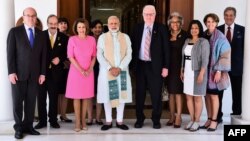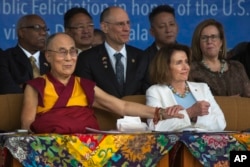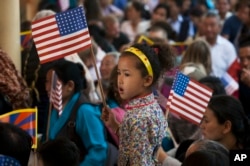A bipartisan U.S. congressional delegation led by House Minority Leader Nancy Pelosi discussed bilateral relations and regional security issues Thursday with Indian Prime Minister Narendra Modi in New Delhi, India.
Pelosi and Modi exchanged views on cooperation, terrorist threats, global warming and human rights issues, including Tibet.
"In our meetings with top government officials, the delegation expressed our gratitude to the Indian government and people of India for hosting His Holiness the Dalai Lama in Dharamsala and for the support of Tibetans living in India," said Pelosi, a California Democrat.
According to Pelosi's website, the group spent two days in Dharamsala and met with the Dalai Lama as well as Lobsang Sangay, the head of the Tibetan government in exile.
During a welcome ceremony Wednesday, Pelosi said the delegation came to "pay tribute to His Holiness [the Dalai Lama], a visionary, a man of compassion, a man of hope." She also expressed her commitment to support Tibetan causes.
"Brutal tactics of the Chinese government to erase the religion, culture and language of the Tibetan people challenge the conscience of the world," she said."We will meet that challenge. Working together, we will meet that challenge."
Representative Jim Sensenbrenner, a Wisconsin Republican, said the U.S. Congress stands in solidarity with "the Tibetan people to be free from the repression that has been put upon them for a very, very long time from Beijing."
Pelosi said gaining a status of "authentic" autonomy for Tibet requires narrowing the differences between Chinese and Tibetan leaders.
"To some in China, an autonomous, authentic Tibet is inconceivable. To us, it is inevitable," she said, "So we must shorten the distance between inconceivable to them and the inevitable to us."
Pelosi led a congressional group to Tibet in 2015, which she said was part of Sangay's proposal for them to visit Tibet and Dharamsala to learn more about the Tibetan situation, according to Tibet.net. Dharamsala is the seat of the Tibetan government in exile.
China considers the Dalai Lama a dangerous separatist who seeks Tibetan independence. The Dalai Lama, Tibet's spiritual leader, and the current exile government, or Tibetan Administration, say they seek only a "genuine" autonomy for Tibet under the People's Republic of China.
International human rights groups and exiles routinely condemn what they call China's oppressive rule in Tibetan areas. They say pervasive surveillance and displays of military force are used to intimidate and quell dissent.
The Dalai Lama told the delegation Tibetans do not need weapons in their struggle for autonomy, and he again called for nonviolence and compassion.
The United States considers Tibet a part of China, but supports Tibetans' right to preserve their unique religious, cultural and linguistic freedom.







